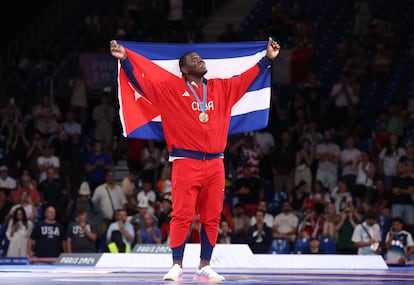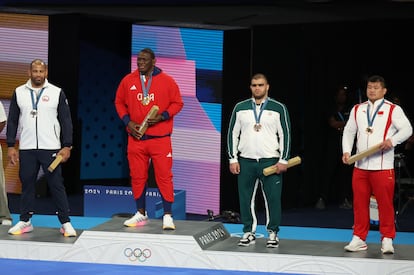Cuba vs Cuba: Mijaín López’s unique Olympic triumph
The Paris Games saw two different Cuban wrestlers compete for the gold: the fighter who remained on the island and his compatriot who defected

Cuba has won its first Gold medal at the Paris Olympic Games. It sparked euphoria, but it is a bittersweet victory. Greco-Roman wrestler Mijaín López went up to the stage of the Champ de Mars stadium with the red singlet on Tuesday afternoon, sure of winning his fifth consecutive Olympic gold despite the predictions of analysts and Sports Illustrated, which expected him to take bronze. The 41-year-old won despite facing much younger contenders, who he defeated one by one, on the blue mat of Paris 2024.
Neither South Korea’s Lee Seungchan, 28, could snatch the gold from López, nor Iranian Amin Mirzazadeh, 26, nor Azerbaijani Sabah Shariati, 35. The final in the 130kg weight class came down to López and another Cuban: Yasmani Acosta, who was representing Chile. The two men entered the center of the mat and hugged each other, as the referee announced their names. In the fight, Mijaín stood firm, and did not allow a single point to be scored. It was a beautiful and also sad dance: Cuba against Cuba itself. At times, it seemed more like Mijaín hugging his friend and former training partner, not wrestling him. Acosta, who had never won a fight against Mijaín, was unable to defeat him in Paris.
In the early hours of 2015, Acosta, 36, left the Cuban delegation at Hotel Fundador, with no passport or money, walked to a corner where a van was waiting for him, and silently disappeared, as many Cuban athletes have done in recent years. It is said that he had to work as a security guard in hotels and at parties in Santiago de Chile, that he taught wrestling classes at an amateur school, that he earned his living as best he could, that it was a long road for him to get to Paris. But on Tuesday, he was fighting for the gold medal against López, his idol, his friend, his fellow countryman. The day he left Hotel Fundador, he said he was hoping to escape Mijaín López’s shadow.
“I was trapped by Mijaín. He is my friend, but he always traveled to important competitions,” Acosta said at the time. “That prevented me from advancing in my sports career. I decided to make a decision.” Acosta is no less Cuban than Mijaín, but all of Cuba was praying for his defeat. The country wanted the gold to go to Mijaín, who is retiring after a long career, just two weeks before turning 42.
Mijaín’s victory has stirred up all kinds of emotions: his supporters have loudly celebrated the win. But others did not want him to win a fifth gold in the same individual event, and thus surpass U.S. athletes Michael Phelps, Katie Ledecky, Carl Lewis, Al Oerter, Vincent Hancock, as well as Danish sailor Paul Elvstrom and Japanese wrestler Icho Kaor, who have only won four golds in the same event. These critics point out that López slapped a Cuban opponent in Chile, who was shouting anti-system slogans and waving the Cuban flag during last year’s Pan American Games. And they have criticized him for dedicating his fourth Olympic title to “our undefeated commander-in-chief.”

Fidel Castro always paid tribute to Cuban athletes. He boasted about sports, he rubbed shoulders with soccer legend Diego Maradona, and he jokingly sparred with boxer Muhammad Ali. He considered the triumphs of Cuban athletes, such as runner Alberto Juantorena, boxer Teófilo Stevenson or the women’s volleyball team, as his own. How could a small island, besieged by the United States, in the midst of the Cold War, be able to produce such elite athletes? And the truth is that Cuba has been a key player in sports for a long time. At the Barcelona Olympic Games in 1992, Cuba came in fifth place in the Olympic medal table, taking home 14 golds. Since Munich 1972, the country has almost always been in the top 10 of the countries with the most medals, on a par with any other power: eighth place in Atlanta 1996, ninth in Sydney 2000, and 11th in Athens 2004.
At the beginning of the Cuban Revolution, Fidel set the course for what sport would become in the country. He opened schools and sports centers, put an end to gambling “in all its commercial forms” and declared sport “the right of the people.” The Revolution invested in athletes, supported their careers, and any achievement, any gain, any medal was always the work of the Revolution: “Sports in our country is not an instrument of politics, sports in our country itself is a consequence of the Revolution,” said Fidel. Sport also served to justify and give meaning to Cuba’s eternal struggle with the United States: “Some day our athletes will also beat Yankee athletes and demonstrate that there is no people superior to another, but there are ideas and concepts superior to others, that there are social systems superior to others.” For years, Cuban athletes dedicated their achievements and medals to Fidel and the Revolution.
They were the decades of glory for Cuban sport. But as the country collapsed economically and politically, sport also collapsed: in 2008, it ranked 19th on the medal tally in Beijing, 16th in London 2012, 18th in Rio 2016, and 14th in Tokyo 2020. Sixty-five years later, the situation is radically different: Cuba is so far in 63rd place in the Paris Olympic medal table; two Cuban athletes have defected in France and set off to explore an uncertain future, like the more than half a million Cubans who have fled the country in the last three years; only 62 athletes are competing for Cuba — the smallest Olympic delegation since Tokyo 1964 — and 21 Cubans are competing for other countries, two of whom are on the Refugee Olympic Team: Ramiro Mora and Fernando Dayán Jorge Enríquez, who defected during a training camp in Mexico, and snuck across the U.S. border. This has angered the Cuban government, with Cuba’s Olympic Committee (COC) calling for “the immediate expulsion” of Jorge Enríquez from the Paris Olympics.

Cuban athletes competing for other countries never cease to bring joy to the family living room, where Cubans gather together, like rarely before, to watch sports. It sounds strange to hear that Jordan Díaz is from Spain, or Melissa Vargas from Turkey, or Ana Laura Portuondo from Canada or Frank Chamizo from Italy, but that is the country Cuba is today, like the literature professor who now teaches at an Ivy League university, or the actor from Havana who is now the face of Televisa.
On Tuesday, Cuba faced off against Cuba itself. But it was not Mijaín López against Yasmani Acosta, who are united by a brotherhood that showed even in the ring. Cuba faced off against the Cuba of the diaspora, against a Cuba that does not exist, against a Cuba of memories.
Mijaín will leave France as one of the best athletes of modern times. On Tuesday, he gave pride to a people living in the diaspora, who celebrate him and adore him as the Olympic God that he is. These are the last Olympics for Mijaín, who won the gold in the same event in Beijing 2008, London 2012, Rio de Janeiro 2016, and Tokyo 2020. Analysts did not expect him to win, but Cubans never questioned it.
Nor did his coach Raúl Trujillo, nor his training partner Ángel Pacheco, who in May left the Cuban delegation in Croatia. Pacheco who was supposed to join Mijaín in his preparation for Paris. “I feel bad for not being able to help you in the last stage of your career,” Pacheco told Mijaín when he decided he would not return to Cuba. “I had to make my decision in order to move forward.” After saying that he would be the only Olympic winner on the mat, Pacheco said: “And remember this, Paris is going to tremble.” And Paris did tremble.
Sign up for our weekly newsletter to get more English-language news coverage from EL PAÍS USA Edition
Tu suscripción se está usando en otro dispositivo
¿Quieres añadir otro usuario a tu suscripción?
Si continúas leyendo en este dispositivo, no se podrá leer en el otro.
FlechaTu suscripción se está usando en otro dispositivo y solo puedes acceder a EL PAÍS desde un dispositivo a la vez.
Si quieres compartir tu cuenta, cambia tu suscripción a la modalidad Premium, así podrás añadir otro usuario. Cada uno accederá con su propia cuenta de email, lo que os permitirá personalizar vuestra experiencia en EL PAÍS.
¿Tienes una suscripción de empresa? Accede aquí para contratar más cuentas.
En el caso de no saber quién está usando tu cuenta, te recomendamos cambiar tu contraseña aquí.
Si decides continuar compartiendo tu cuenta, este mensaje se mostrará en tu dispositivo y en el de la otra persona que está usando tu cuenta de forma indefinida, afectando a tu experiencia de lectura. Puedes consultar aquí los términos y condiciones de la suscripción digital.









































